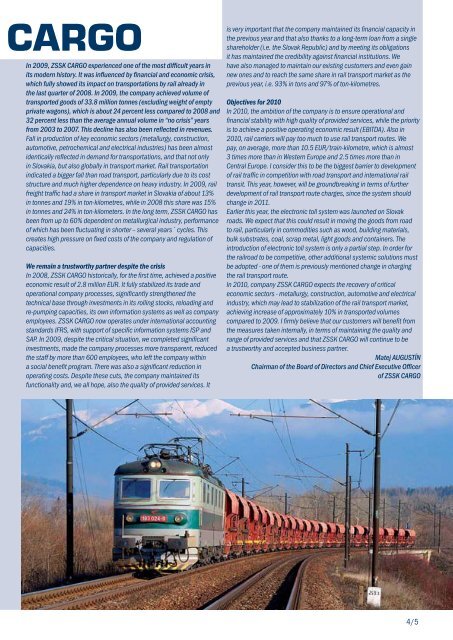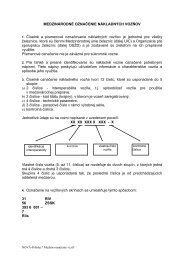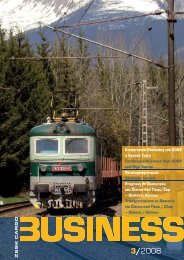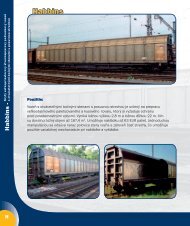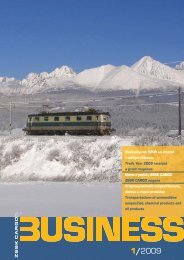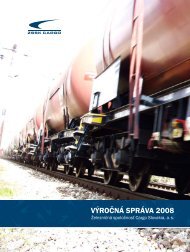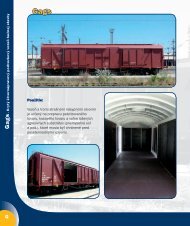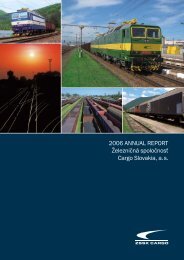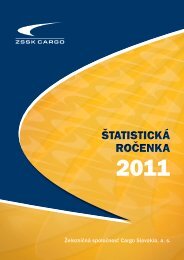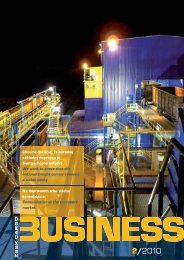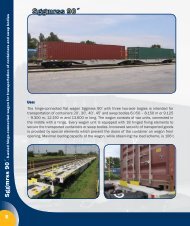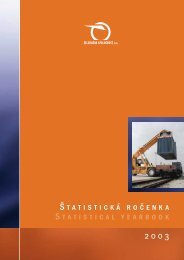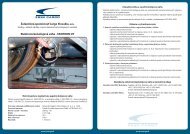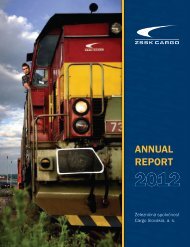CARGO BUSINESS 1-10.indd - ZSSK Cargo
CARGO BUSINESS 1-10.indd - ZSSK Cargo
CARGO BUSINESS 1-10.indd - ZSSK Cargo
- No tags were found...
Create successful ePaper yourself
Turn your PDF publications into a flip-book with our unique Google optimized e-Paper software.
<strong>CARGO</strong><br />
In 2009, <strong>ZSSK</strong> <strong>CARGO</strong> experienced one of the most difficult years in<br />
its modern history. It was influenced by financial and economic crisis,<br />
which fully showed its impact on transportations by rail already in<br />
the last quarter of 2008. In 2009, the company achieved volume of<br />
transported goods of 33.8 million tonnes (excluding weight of empty<br />
private wagons), which is about 24 percent less compared to 2008 and<br />
32 percent less than the average annual volume in “no crisis” years<br />
from 2003 to 2007. This decline has also been reflected in revenues.<br />
Fall in production of key economic sectors (metallurgy, construction,<br />
automotive, petrochemical and electrical industries) has been almost<br />
identically reflected in demand for transportations, and that not only<br />
in Slovakia, but also globally in transport market. Rail transportation<br />
indicated a bigger fall than road transport, particularly due to its cost<br />
structure and much higher dependence on heavy industry. In 2009, rail<br />
freight traffic had a share in transport market in Slovakia of about 13%<br />
in tonnes and 19% in ton-kilometres, while in 2008 this share was 15%<br />
in tonnes and 24% in ton-kilometers. In the long term, <strong>ZSSK</strong> <strong>CARGO</strong> has<br />
been from up to 60% dependent on metallurgical industry, performance<br />
of which has been fluctuating in shorter – several years´ cycles. This<br />
creates high pressure on fixed costs of the company and regulation of<br />
capacities.<br />
We remain a trustworthy partner despite the crisis<br />
In 2008, <strong>ZSSK</strong> <strong>CARGO</strong> historically, for the first time, achieved a positive<br />
economic result of 2.8 million EUR. It fully stabilized its trade and<br />
operational company processes, significantly strengthened the<br />
technical base through investments in its rolling stocks, reloading and<br />
re-pumping capacities, its own information systems as well as company<br />
employees. <strong>ZSSK</strong> <strong>CARGO</strong> now operates under international accounting<br />
standards IFRS, with support of specific information systems ISP and<br />
SAP. In 2009, despite the critical situation, we completed significant<br />
investments, made the company processes more transparent, reduced<br />
the staff by more than 600 employees, who left the company within<br />
a social benefit program. There was also a significant reduction in<br />
operating costs. Despite these cuts, the company maintained its<br />
functionality and, we all hope, also the quality of provided services. It<br />
is very important that the company maintained its financial capacity in<br />
the previous year and that also thanks to a long-term loan from a single<br />
shareholder (i.e. the Slovak Republic) and by meeting its obligations<br />
it has maintained the credibility against financial institutions. We<br />
have also managed to maintain our existing customers and even gain<br />
new ones and to reach the same share in rail transport market as the<br />
previous year, i.e. 93% in tons and 97% of ton-kilometres.<br />
Objectives for 2010<br />
In 2010, the ambition of the company is to ensure operational and<br />
financial stability with high quality of provided services, while the priority<br />
is to achieve a positive operating economic result (EBITDA). Also in<br />
2010, rail carriers will pay too much to use rail transport routes. We<br />
pay, on average, more than 10.5 EUR/train-kilometre, which is almost<br />
3 times more than in Western Europe and 2.5 times more than in<br />
Central Europe. I consider this to be the biggest barrier to development<br />
of rail traffic in competition with road transport and international rail<br />
transit. This year, however, will be groundbreaking in terms of further<br />
development of rail transport route charges, since the system should<br />
change in 2011.<br />
Earlier this year, the electronic toll system was launched on Slovak<br />
roads. We expect that this could result in moving the goods from road<br />
to rail, particularly in commodities such as wood, building materials,<br />
bulk substrates, coal, scrap metal, light goods and containers. The<br />
introduction of electronic toll system is only a partial step. In order for<br />
the railroad to be competitive, other additional systemic solutions must<br />
be adopted - one of them is previously mentioned change in charging<br />
the rail transport route.<br />
In 2010, company <strong>ZSSK</strong> <strong>CARGO</strong> expects the recovery of critical<br />
economic sectors - metallurgy, construction, automotive and electrical<br />
industry, which may lead to stabilization of the rail transport market,<br />
achieving increase of approximately 10% in transported volumes<br />
compared to 2009. I firmly believe that our customers will benefit from<br />
the measures taken internally, in terms of maintaining the quality and<br />
range of provided services and that <strong>ZSSK</strong> <strong>CARGO</strong> will continue to be<br />
a trustworthy and accepted business partner.<br />
Matej AUGUSTÍN<br />
Chairman of the Board of Directors and Chief Executive Officer<br />
of <strong>ZSSK</strong> <strong>CARGO</strong><br />
4/5


